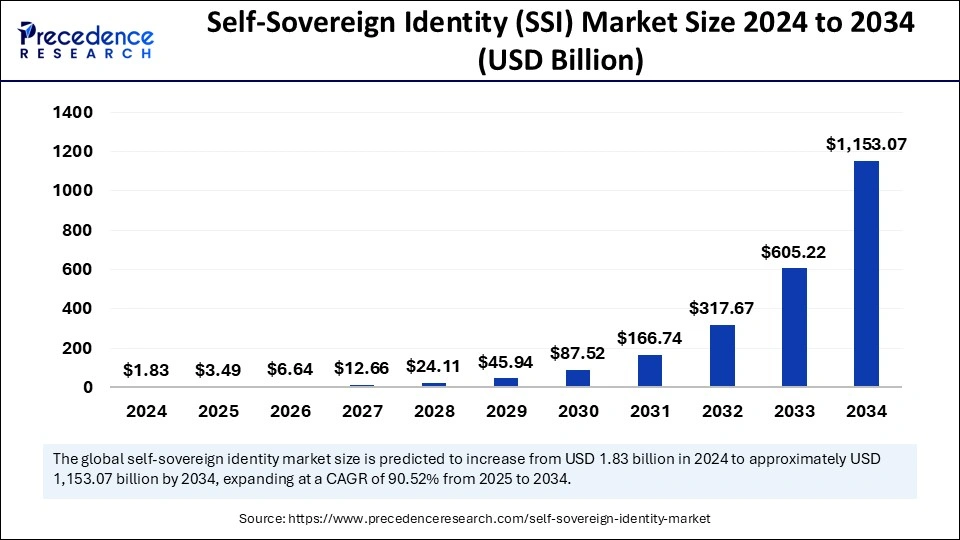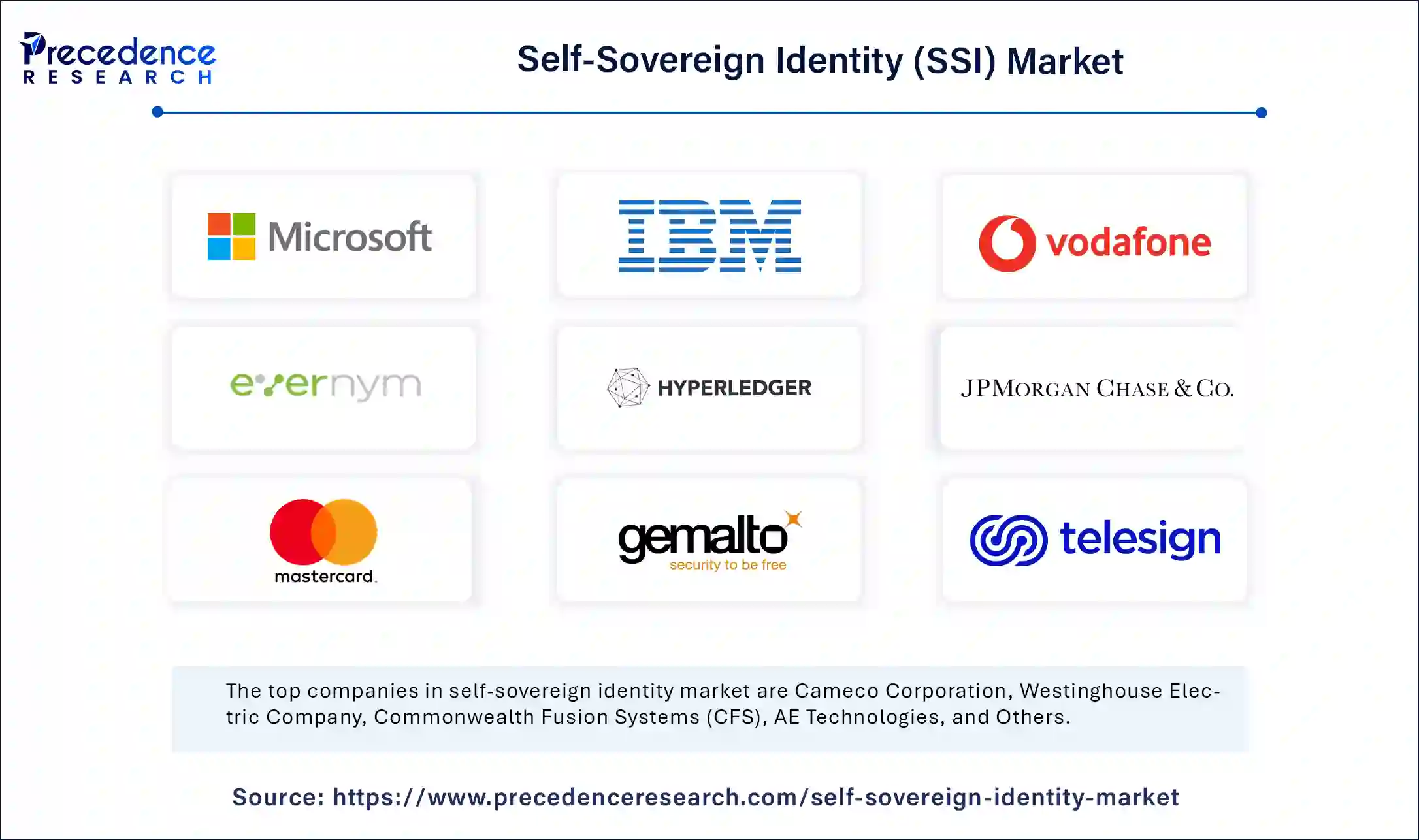November 2024
The global self-sovereign identity (SSI) market size is evaluated at USD 3.49 billion in 2025 and is forecasted to hit around USD 1,153.07 billion by 2034, growing at a CAGR of 90.52% from 2025 to 2034. The market sizing and forecasts are revenue-based (USD Million/Billion), with 2024 as the base year.
The global self-sovereign identity (SSI) market size was estimated at USD 1.83 billion in 2024 and is predicted to increase from USD 3.49 billion in 2025 to approximately USD 1,153.07 billion by 2034, expanding at a CAGR of 90.52% from 2025 to 2034. The demand for digital identity solutions has increased, driving the market. The increased concern about identity theft and fraud is driving the shift toward the adoption of self-sovereign identity solutions.

Artificial intelligence (AI) significantly revolutionized the self-sovereign identity (SSI) market by automating crucial procedures, like identity verification, credential issuing, and fraud detection. AI-powered identity verification and authentication solutions enable the detection and prevention of identity theft and fraud more effectively. AI increases efficiency and reduces errors in the streamlined process.
Organizations are determined to leverage AI with self-sovereign identity technologies for better risk management and enhanced user experience. The ability of AI to provide personalized and intuitive experiences makes it popular. The emphasis of organizations to comply with strict regulations is expected to create opportunities for AI integration in self-sovereign identity technology.
The self-sovereign identity (SSI) market has witnessed transformative growth in the last few years due to increased adoption of digital identity frameworks in various industries like BFSI, government, media and entertainment, healthcare, travel and hospitality, real estate and construction, and IT and telecommunications. SSI is a vast and diverse potential application that streamlines online authentication and KYC processes to enable secure voting systems and healthcare records management. Factors like growing concern over identity theft and fraud, adoption of blockchain technologies, and government promotions of decentralization are contributing to this growth.
Industries like focusing on leveraging self-sovereign identity profiles with connected ecosystems, fostering greater data ownership, privacy, and security for individuals and organizations. Healthcare and government are the major organizations adopting self-sovereign identity solutions for the protection of sensitive data and ensuring compliance. Government and regulatory initiatives like General Data Protection Regulations (GDPR) are projected to promote high adoption of self-sovereign identity solutions.
| Report Coverage | Details |
| Market Size by 2034 | USD 1,153.07 Billion |
| Market Size by 2025 | USD 3.49 Billion |
| Market Size by 2024 | USD 1.83 Billion |
| Market Growth Rate from 2025 to 2034 | CAGR of 90.52% |
| Dominated Region | North America |
| Fastest Growing Market | Asia Pacific |
| Base Year | 2024 |
| Forecast Period | 2025 to 2034 |
| Segments Covered | Network Type, Identity Type, Enterprise Type, Industry, and Regions |
| Regions Covered | North America, Europe, Asia-Pacific, Latin America and Middle East & Africa |
Growing numbers of data breaches and security threats
Increased numbers of data breaches and security threats are the major factors that have increased the adoption of self-sovereign identity solutions in organizations. The need to protect sensitive data makes it essential to utilize self-sovereign identity technologies. Organizations are facing incidents of data breaches and security threats, driving demand for self-sovereign identity solutions to improve security and privacy concerns.
The increased need for decentralized identity solutions to enhance security, privacy, and user control is driving the adoption of these technologies. Industries are seeking more accurate and scalable technologies to overcome identity theft and fraud, driving the adoption of self-sovereign identity solutions. Additionally, the self-sovereign solutions help to comply with regulatory compliance and requirements, making them more popular among organizations.
Integration challenges with existing systems
The integration challenges with the existing system are the major restraints for the growth of the self-sovereign identity (SSI) market. The self-sovereign identity solutions require data to be formatted in specific ways, which causes its incompatibility with the existing system. Additionally, the requirement of significant scalability and performance improvement integration of these technologies with the existing system further causes challenges. The integration and complexity of these technologies with existing systems further contribute to increasing costs.
Rising demand for secure and privacy-focused solutions
The demand for secure and privacy-focused solutions has increased due to growing concerns over data privacy and security. Organizations are rapidly adopting blockchain technologies, driving the need for secure, tamper-resistant identity management capabilities. The increased need for secure digital identity solutions is contributing to the increasing demand for self-sovereign identity solutions for secure, decentralized, and user-centric identity management capabilities.
The demand for secure and privacy-focused solutions has witnessed growth among industries like healthcare, telecommunication, finance, government, and education. The self-sovereign identity (SSI) market is further projected to adopt growth through the rising integration of emerging technologies and technological advancements like cryptography.
The permissioned segment dominated the self-sovereign identity (SSI) market in 2024. The permissioned network offers a controlled and secure ecosystem. These networks help to improve security protocols and regulate access for areas where identity verification and privacy are critical. This network authorizes individuals to engage with the system and offers increased security and governance. Industries like BFSI, healthcare, and government are the major adopters of permissioned network-based self-sovereign identity solutions. The industries have increased the adoption of these networks to comply with regulatory requirements, enhance security measurements, and improve user experience.
The permissionless segment is projected to witness notable growth in the coming years due to its nature of offering open and decentralized network solutions within the blockchain and self-sovereign identity areas. This network allows participation without the need for permission. The need for secure and transparent identity management solutions drives demands for permissionless networks. Organizations are adopting permissionless self-sovereign identity solutions for secure, decentralized, and user-centric identity management.
The biometrics segment generated the largest self-sovereign identity (SSI) market share in 2024 and is expected to experience further growth over the forecast period. The segment growth is driven by increased adoption of biometric-based self-sovereign identity solutions in the companies. Companies are focusing on adopting secure, convenient, and user-friendly identity verification technologies. This technology provides multi-factor authentications such as face recognition, fingerprint scanning, voice recognition, and behavioral biometrics. Increased use of consumer electronics like smartwatches, smartphones, and smart homes is also contributing to the high adoption of biometric identity verification technologies. The need for accurate, secure, and speedy identity verifications has led to a surge in biometrics. Technological advancements such as the integration of emerging technologies with biometrics are expected to boost the market area in the forecast period.
The large enterprises segment dominated the self-sovereign identity (SSI) market with the largest share in 2024 due to the requirements of sophisticated data management in this enterprise. Large enterprises need complex identity management, which drives demands for scalable and secure technologies to manage the individual data of large user populations. With a higher IT budget, enterprises can invest in advancements in self-sovereign identity solutions. Additionally, the need to comply with stringent security and compliance requirements drives the adoption of self-sovereign identity solutions in large companies.
On the other hand, the small and medium-sized enterprise segment is projected to experience the fastest growth during the forecast period. The enterprise has witnessed the rapid adoption of self-sovereign identity solutions due to the need for digital transformation. Small and medium-sized enterprises are under digital transformation, driving demand for secure and efficient identity management solutions. The cost-effectiveness of self-sovereign identity solutions makes them popular in small and medium-sized enterprises. The increased adoption of cloud services and risk over cybersecurity in these enterprises is contributing to the increasing need for robust identity management solutions, driving the adoption of self-sovereign identity technology.
The BFSI segment dominated the self-sovereign identity (SSI) market in 2024, driven by increased adoption of blockchain-based self-sovereign identity for KYC verifications. The industry faces a high risk of identity theft and fraud. A large consumer base and need for secure digital channels drive adoption for secure and speedy identity management solutions. The need to comply with stringent regulatory requirements drives the adoption of self-sovereign identity solutions in the BFSI industry.
However, the healthcare and life sciences segment is poised for substantial growth over the forecast period. The self-sovereign identity solutions provide secure patient data management and access to healthcare services. The healthcare and life sciences industry is rapidly adopting digital health technologies. Increased decentralization in healthcare, like telemedicine and electronic health records (EHRs), is driving the requirement for secure identity management solutions. Government initiatives and allowing industry to adopt edge technologies to comply with regulatory requirements and compliance. Additionally, the ongoing emphasis of the industry on the integration of advanced technologies to improve collaboration and data sharing drives demand for self-sovereign identity solutions.
North America dominated the self-sovereign identity (SSI) market with the largest market share in 2024 due to various factors like the presence of strong data protection regulations, key market vendors, and high investments in computer giants. The high adoption of decentralization in various industries has contributed to the growing demand for decentralized identity solutions. The well-established healthcare sector is the major adapter of self-sovereign identity technology in the region. North America has witnessed significant demand growth for secure and user-centric identity management solutions.
Increased Decentralization Adoption Fueling the U.S. Self-Sovereign Identity Market Growth
The United States leads the regional market with the presence of strong technology companies such as Microsoft, Google, and Amazon. These companies are high investors in self-sovereign identity technologies. The rising demand for decentralized identity solutions and the adoption of digital identity solutions are driving demand for self-sovereign identity technologies. Government and strict data protection regulations are projected to fuel the market growth.
Asia Pacific is projected to experience the highest growth in the self-sovereign identity (SSI) market during the forecast period, driven by increasing digitalization and technological advancements. Governments of countries like India, China, Japan, and South Korea play a vital role in this growth. Promoting digital identity solutions, driving the adoption of self-sovereign identity technologies. The adoption of blockchain technology has increased in Asia. With the rising demand for secure identity solutions, the region is expected to lead the market in the upcoming period.
Large Population to Boost China’s Position in the Self-Sovereign Identity Market
China is leading the regional market due to the high adoption of smartphones and internet connectivity in the country's population. Demand for advanced technologies leveraging the adoption of self-sovereign identity technologies. Large populations and ongoing digital technology adoptions are boosting the market in China. Additionally, government support for promoting the development and utilization of digital identity frameworks increases the adoption rate of self-sovereign identity technologies.
Europe is considered to be a significantly growing region in the global self-sovereign identity (SSI) market. Europe's digital transformation approaches are driving the expansion in the adoption rate of digital identity solutions. The presence of major organizational giants in the region is empowering the development and promotion of self-sovereign identity technologies. Organizations in Europe are recognizing SSI's value in enhancing security, compliance, and user experience.
Germany is leading the regional market, driven by the presence of key market vendors and government support. The government in Germany actively promotes the development of digital technologies. Germany is leveraging opportunities for self-sovereign identity principle integration with existing industry ecosystems.

By Network Type
By Identity Type
By Enterprise Type
By Industry
By Region
For inquiries regarding discounts, bulk purchases, or customization requests, please contact us at sales@precedenceresearch.com
No cookie-cutter, only authentic analysis – take the 1st step to become a Precedence Research client
November 2024
February 2025
April 2025